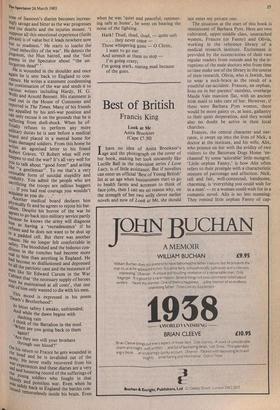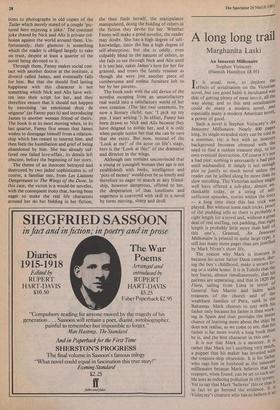Best of British
Francis King
Look at Me Anita Brookner (Cape £7.50) T have no idea of Anita Brookner's 1 age and the photograph on the cover of her book, making her look uncannily like Lucille Ball in the television series I Love Lucy, is of little assistance. But if novelists can enter an official 'Best of Young British' list at an age when businessmen start to go to health farms and actresses to think of face-jobs, then I can see no reason why, on the strength of her two wrily clever earlier novels and now of Look al Me, she should
not enter my private one.
The situation at the start of this book is reminiscent of Barbara Pym. Here are two cultivated, upper-middle class, unattached women, Frances (or Fanny) and Olivia, working in the reference library of a medical research institute. Excitement is provided by the eccentricities of their two regular readers from outside and by the ir- ruptions of the male doctors who from time to time make use of the library in the course of their research. Olivia, who is Jewish, has to wear a neck-brace as the result of a youthful car-accident. Frances, an orphan, lives on in her parents' tasteless, overlarge Maida Vale mansion flat, with an ancient Irish maid to take care of her. However, if these were Barbara Pym women, there would be more gaiety or, at least, gallantry to their quiet desperation, and they would also no doubt be active in their local churches.
Frances, the central character and nar- rator, is swept up into the lives of Nick, a doctor at the institute, and his wife, Alix, who pounce on her with the avidity of two visitors to the Battersea Dogs Home 'en- chanted' by some 'adorable' little mongrel. 'Little orphan Fanny,' is how Alix often refers to their protegee with a characteristic mixture of patronage and affection. Nick, tall and fair, well-connected, handsome, charming, is 'everything you could wish for in a man' — or a woman could wish for in a romantic novel. Alix is no less stunning. They remind little orphan Fanny of cap-
tions to photographs in old copies of the Taller which merely stated of a couple 'pic- tured here enjoying a joke.' The constant joke shared by Nick and Alix is private col- lusion against the world around them. Un- fortunately, their glamour is something which the reader is obliged largely to take on trust, despite at least a quarter of the novel being devoted to it.
Through them, Fanny makes social con- tact with another doctor at the institute, a divorce called James, and eventually falls for him. But that she should find lasting happiness with this character is not something which Nick and Alix have writ- ten into their script for her, and they therefore ensure that it should not happen by exercising 'an emotional droit de seigneur' (as Fanny puts it) and introducing James to another woman friend of theirs. The book is at its most moving when, in its • last quarter, Fanny first senses that James wishes to disengage himself from a relation- ship which has ceased to interest him, and then feels the humiliation and grief of being abandoned by him. She has already suf- fered one failed love-affair, its details left obscure, before the beginning of her story.
The theme of an innocent betrayed and destroyed by two jaded sophisticates is, of course, a familiar one, from Les Liaisons Dangereuses to The Wings of the Dove. In this case, the victim is a would-be novelist, with the consequent irony that, having been eager to make the real life characters around her do her bidding in her fiction,
she then finds herself, the manipulator manipulated, doing the bidding of others in the fiction they devise for her. Whether Fanny will make a good novelist, the reader may doubt. She has a high degree of self- knowledge, since she has a high degree of self-absorption; but she is oddly, even culpably blind to the natures of others, as she fails to see through Nick and Alix until it is too late, takes James's love for her for granted, and treats the family retainer as though she were just another piece of cumbersome and useless furniture left to her by her parents.
The book ends with the old device of the novelist escaping from an Unsatisfactory real world into a satisfactory world of her own creation. (The last two sentences, by now a literary cliché, run: 'I pick up my pen. I start writing.'). In effect, Fanny has been drawn to Nick and Mix because they have deigned 'to notice her, and it is only when people notice her that she can be sure that she exists. But now, instead of the 'Look at me!' of the actor on life's stage, hers is the 'Look at this!' of the dramatist and director in the wings.
Although one remains unconvinced that a young or youngish woman (her age is not established) with looks, intelligence and 'pots of money' would ever be so lonely and therefore so eager to snatch at any friend- ship, however dangerous, offered to her, the desperation of that loneliness and eagerness is conveyed with skill in a novel by turns moving, sharp and droll.















































 Previous page
Previous page